8 start with O start with O
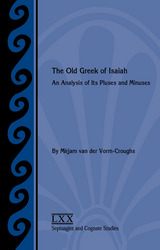
A concise study of a large number of examples of pluses and minus providing insight into translation from Hebrew to Greek
Van der Vorm-Croughs focuses this translation study on the processes leading to pluses and minuses including linguistic and stylistic aspects (i.e., cases in which elements have been added or omitted for the sake of a proper use of the Greek language), literary aspects (additions and omissions meant to embellish the Greek text), translation technical aspects (e.g., the avoidance of redundancy), and contextual and intertextual exegesis and harmonization. This work also covers the relation between the Greek Isaiah and its possible Hebrew Vorlage to try to determine which pluses and minuses may have been the result of the translator’s use of a different Hebrew text.
Features:
- Eleven categories for the pluses and minuses of the Greek Isaiah
- Examination of translation techniques and translator errors
- Use of Joseph Ziegler’s critical edition
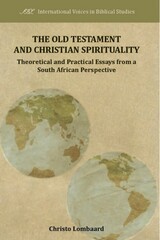
An engaging anthology that deals with both theory and practice
The emerging discipline of biblical spirituality considers how faith finds expression within the biblical texts and how modern expressions of faith interact with those texts. This volume represents Christo Lombaard’s reflective, analytical, and exegetical contributions to the field in order to explore how biblical texts mediate faith, both ancient and contemporary. It reflects on aspects of the interaction of faith and Scripture, critically approaching both dimensions.
Features:
- Seven previously published papers drawn predominately from South African journals
- Explorations of how biblical texts mediate faith
- Close examination of the discipline of biblical spirituality as part of spirituality studies

This book also explores the intriguing ways in which Latter-day Saints have interpreted and engaged with this ancient text and the author navigates their diverse interpretations of it. He examines how individuals have alternately embraced the Old Testament as myth or history, law or legend, wise counsel or sacred scripture. He shows where many traditional interpretations have come from, and offers many ways to encourage a more nuanced understanding of the text.
Drawing from a wealth of scholarly research and his own unique perspective, Douglas presents a compelling and multidimensional analysis of the Old Testament. However readers approach the text, this book sheds light on the complex nature of the Old Testament and its enduring relevance to the Latter-day Saint tradition.

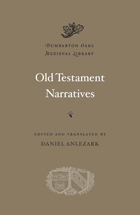
The Old English poems in this volume are among the first retellings of scriptural texts in a European vernacular. More than simple translations, they recast the familiar plots in daringly imaginative ways, from Satan's seductive pride (anticipating Milton), to a sympathetic yet tragic Eve, to Moses as a headstrong Germanic warrior-king, to the lyrical nature poetry in Azarias.
Whether or not the legendary Caedmon authored any of the poems in this volume, they represent traditional verse in all its vigor. Three of them survive as sequential epics in a manuscript in the Bodleian Library at Oxford. The first, the Old English Genesis, recounts biblical history from creation and the apocryphal fall of the angels to the sacrifice of Isaac; Abraham emerges as the central figure struggling through exile toward a lasting covenant with God. The second, Exodus, follows Moses as he leads the Hebrew people out of Egyptian slavery and across the Red Sea. Both Abraham and Moses are transformed into martial heroes in the Anglo-Saxon mold. The last in the triad, Daniel, tells of the trials of the Jewish people in Babylonian exile up through Belshazzar's feast. Azarias, the final poem in this volume (found in an Exeter Cathedral manuscript), relates the apocryphal episode of the three youths in Nebuchadnezzar's furnace.
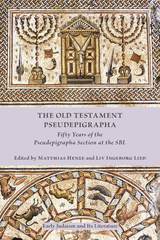
A history of research that changed scholarly perceptions of early Judaism
This collection of essays by some of the most important scholars in the fields of early Judaism and Christianity celebrates fifty years of the study of the Old Testament Pseudepigrapha at the Society of Biblical Literature and the pioneering scholars who introduced the Pseudepigrapha to the Society. Since its early days as a breakfast meeting in 1969, the Pseudepigrapha Section has provided a forum for a rigorous discussion of these understudied texts and their relevance for Judaism and Christianity. Contributors recount the history of the section's beginnings, critically examine the vivid debates that shaped the discipline, and challenge future generations to expand the field in new interdisciplinary directions.
Features:
- Reflections from early members of the Pseudepigrapha Group
- Essays that examine a methodological shift from capturing and preserving traditions to exploring the intellectual and social world of Jewish antiquity
- Evaluations of past interactions with adjacent fields and the larger academic world
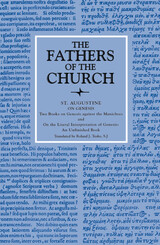

The book of Job is a complex, sophisticated treatment of the problem of undeserved suffering. It is also a sustained meditation on creation, on humanity’s place in creation, and on God’s ordering of creation. In this study, Kathryn Schifferdecker offers a close literary and theological reading of the book of Job—particularly of the speeches of God at the end of the book—in order to articulate its creation theology, which is particularly pertinent in our environmentally-conscious age.
After all of Job’s agonized questioning, God’s answer does not directly address Job’s questions about undeserved suffering or divine justice. Instead, the divine speeches take Job on a God’s-eye tour of creation in all its beauty and complexity. In extraordinarily detailed and beautiful poetry, the divine speeches show Job that the world is radically non-anthropocentric, that there exist wild places and animals whose value has nothing to do with their usefulness to humanity, and that God delights in the freedom of God’s creatures. This vision of the divine speeches enables Job to move out of despair into renewed participation in God’s often-dangerous but beautiful world.
This creation theology of Job, virtually unique in the Bible, has much to say to us today, as we struggle theologically and politically with the issues of environmental degradation and humanity’s relationship to the natural world.
READERS
Browse our collection.
PUBLISHERS
See BiblioVault's publisher services.
STUDENT SERVICES
Files for college accessibility offices.
UChicago Accessibility Resources
home | accessibility | search | about | contact us
BiblioVault ® 2001 - 2024
The University of Chicago Press









